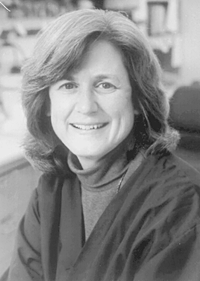![[Currents header graphic]](/homeart/currents_header.gif)
![[Currents header graphic]](/homeart/currents_header.gif)
September 15, 1997

|
|
Mary-Claire King
|
By Robert Irion
Geneticist Mary-Claire King, one of the country's most prominent breast-cancer researchers, will discuss the latest research on genetic predispositions toward cancer in a public lecture this week at UCSC. King's talk, titled "Genetic Analysis of Breast and Ovarian Cancer," begins at 7 p.m. on Friday, September 19, at the new Music Center Recital Hall. Admission is free.
UCSC is sponsoring the lecture in conjunction with the American Cancer Society, which will hold a national meeting on cancer research from September 18 through 21 at the Chaminade Conference Center. The meeting, the first Schilling Research Conference, is funded through a $1.6 million legacy to the American Cancer Society by the late Colonel Frank K. Schilling of Santa Cruz. Col. Schilling's wife, Else H. "Henny" Schilling, succumbed to breast cancer in 1985.
King will attempt to describe the impacts of current breast-cancer research on the lives of women. Many women's magazines today contain articles about breast cancer, often with descriptions of genetic research and gene testing. However, this flurry of findings can perplex all but the most dedicated followers of the subject.
An experienced public speaker, King will place this research into an everyday context for the audience. She also will answer questions following her talk.
King is the Walt Disney-American Cancer Society Research Professor for Breast Cancer and a professor of medical genetics at the University of Washington. She gained renown in 1990 for leading a team of scientists that discovered the location of the gene called BRCA1. The researchers believe that defects in this gene, passed from one generation to the next, cause roughly 10 percent of all cases of breast cancer. The gene also appears to play a role in some ovarian cancers.
King began her search for the BRCA1 gene in 1974, at a time when most of the scientific community did not believe breast cancer could be hereditary. She was driven by a conviction that breast cancer cannot be prevented, but can be controlled. Her discovery has opened a new approach to the prevention, control, and treatment of breast cancer.
King's current projects include research with seven major cancer centers in New York City to identify the role of inherited susceptibility to breast cancer among Jewish women, and with the University of North Carolina to ask the same questions among rural southern African-American and Caucasian women. King's team also is investigating the interaction of inherited susceptibility and environmental risk factors among 120,000 participants in the Harvard Nurses' Health Study.
In other research, King's group is testing whether tamoxifen reduces risk for breast cancer among women with inherited susceptibility. Finally, King and collaborators from Vanderbilt University have begun a clinical trial to test gene therapy as treatment for ovarian cancer.
The American Cancer Society is the largest nationwide voluntary health organization dedicated to eliminating cancer as a major health problem. The society focuses on preventing cancer, saving lives from cancer, and diminishing suffering from cancer through research, education, advocacy, and service.